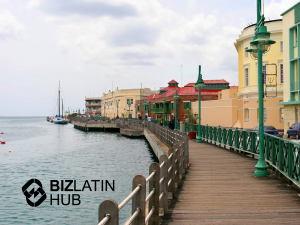The Argentine economy faces challenges in the process of stabilizing its macroeconomic imbalances, dealing with a high fiscal deficit, and a high level of inflation.
In this context, the main economic policy variables such as the exchange rate and interest rates show high volatility that hinders investment processes and, therefore, economic growth.
Investments by Argentine entrepreneurs into Uruguay have increased significantly in recent years. This is largely due to the legal security offered by the country and its stable financial system. This makes Uruguay an advantageous destination for doing business, particularly in its real estate and technology sector.
In recent times, our Biz Latin Hub legal and accounting experts have encountered a growing number of cases of Argentine businesses requesting to form a company and obtain tax residence in Uruguay. We explore several main drawcards of Uruguay’s business climate that are drawing in new investors.
Argentina Businesses Investing in Uruguay – Taxation characteristics in Argentina?

In Argentina, companies mainly pay the following taxes:
- Income Tax: rate of 35% if the company distributes dividends
- Gross Revenue: average rate of 3%
- Safety and Hygiene: average rate of 1%
- Bank operations Tax: 1.2% (note small and micro businesses are exempt from this)
- Social Security: the contribution rate can reach up to 40%.
In addition, there are a number of regimes (information, retention, perception, etc), that requires the taxpayer to provide information related to the company’s activity in a monthly basis, either on purchases and sales, withholding and payable taxes, and the nature of the operations carried out.
In addition, there are countless jurisdictions with their own rules in Argentina, and each have key differences in comparison with each other. Besides national law, there are 24 provinces, each with their own municipalities operating within them. This makes it difficult to fully understand all regulatory requirements, and stay compliant with local law.
Tax regime advantages in Uruguay
In Uruguay, on the contrary, many facets of the country’s tax laws are simpler and less expensive.
Ficta Settlement Regime
The first thing worth noting in the Uruguayan tax system is the ‘Ficta Settlement Regime’ (known as Régimen de Liquidación Ficta or IRAE). The IRAE is a tax on the business activity and its profit. This regime applies to companies based in Uruguay that earn up to US$450,000 in annual sales.
This regime would be the equivalent to what is commonly known as income tax, and it’s a highly competitive and attractive rate for Argentine companies.
When companies combine capital and labor income, they pay the following rates, depending on the level of income (in dollars) they have:
Companies that invoice up to US$450,000 pay 3.3% as income tax in Uruguay. For companies based in Argentina, only considering the Gross Income Tax (average rate 3%), we would almost match what is paid in the neighboring country.
The IRAE details all the different situations, in the following link you will be able to check the information that best suits your needs.
Uruguay doesn’t tax internationally-sourced income

In Argentina, residents pay taxes for all the goods and all the income they get, regardless of the origin of the source – that is, both locally and internationally sourced income and goods are taxed. In Uruguay, only income generated locally is taxed, as are Uruguayan goods.
For example, if a company based in Uruguay obtains an income for a service provided in Argentina, it does not pay taxes on that service. On the other hand, if a company based in Argentina obtains an income for a service provided in Uruguay, it does pay taxes in Argentina.
The same applies if an Uruguayan-based company or individual owns assets (such as real estate, cars, bank accounts) in Argentina: they aren’t required to pay taxes in Uruguay.
The country has had strong political and social stability for years, backed by a consolidated democracy and strong legal certainty. This stability is a pillar of confidence in the country’s business climate. Such a commercial environment is incredibly appealing to Argentine investors when considering their options, especially given the proximity of the two countries and the relative ease of expansion/transition.
Ease of doing business
Uruguay guarantees equal treatment for investors and operation free of special conditions for foreign business activity, both in terms of capital mobility and dividends, and in relation to the purchase and sale of foreign currency. The country sits above the regional average ranking by the World Bank Group for ease of doing business, and comes tenth regionally. Special investment promotional schemes under the country’s ‘Investment Law’ enable and empower new businesses entering the market, and aims to further boost FDI flows.
This is attracting interest from a raft of investors not just looking for their next move from Argentina, but in the wider regional context too.

Good reason for doing business – Leading connectivity
Uruguay is the country with the highest internet penetration and fastest download speed in the region.
Uruguay is one of the most advanced Latin American countries when it comes to online connectivity, according to the Information and Communication Technologies (ICT) Development Index, prepared by the International Telecommunications Union (ITU) in 2014. This fact is also reflected in the degree of internet penetration and in mobile phone users, where our country occupies a prominent position in the region.
Expanding your business to Uruguay?
Due to all the advantages mentioned above – political stability, geographical location, tax regime, legal certainty and ease of moving capital and doing business within the country and abroad – we consider Uruguay as an economy offering opportunities unavailable in other South American countries in this moment.
Biz Latin Hub, a global back office firm with a local perspective provides a suite of market-entry and back-office services across Latin America, including in Uruguay. Our local legal and financial experts take due care to ensure your business is compliant and in the best position to succeed. Let us support your business in Uruguay. If you require personalized information, please reach out to our team here at Biz Latin Hub today.
Learn more about our team and expert authors.





